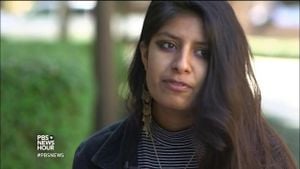Voters across Ireland prepared to head to the polls on Friday, November 29, 2024, amid rising tensions surrounding two pressing issues: the country’s housing crisis and increasing concerns about immigration. The election has become increasingly polarized, with dissatisfaction directed particularly at the governing center-right parties, Fine Gael and Fianna Fail, who have been perceived as ineffective in tackling these urgent matters.
The housing crisis looms large over the election, with many Irish citizens struggling to find affordable accommodation as property prices have jumped by around 10% year-on-year, making it difficult for young professionals, such as teachers and nurses, to secure homes. A report by the government-established housing commission revealed the nation is facing a deficit of up to 256,000 homes, fueling desperation among those caught in the rental market.
Anne-Marie Kerry, a restaurant worker who feels the weight of the housing situation, expressed the frustrations felt by many. “There are many elderly people who are just being turfed out because of the way prices of property are just going through the roof,” she lamented. Such sentiments resonate widely, as housing affordability has become a key determinant for voters this election.
Simultaneously, immigration issues have surfaced as another dividing line among the populace, with rising numbers of newcomers igniting heated debates about the country’s policies. Unlike several other European nations, Ireland has not seen the rise of prominent far-right political parties. Instead, independent candidates with varied stances on immigration have emerged, catering to the electorate's polarized views. Some independent candidates advocate limiting state support for immigrants, arguing they should contribute rather than dependent solely on government assistance.
The prominent figure attracting attention this election is Gerry “the Monk” Hutch, who has been implicated by prosecutors as the head of an organized crime group involved in robbery and drug smuggling. Despite his checkered past, Hutch’s candidacy appeals to voters frustrated by traditional political avenues. Many see no substantial difference between politicians and criminals, indicating widespread disillusionment with representatives who have failed to address their concerns adequately.
This general dissatisfaction with politicians is compelling numerous voters to explore independent candidates running from various points along the political spectrum. Hutch, with his criminal background, symbolizes one extreme, representing discontent for those who feel ignored by the mainstream political scene.
Current Prime Minister Leo Varadkar, leader of Fine Gael, is seeking to maintain his position but has faced scrutiny after several gaffes during the campaign. One incident, when he was caught on video treating disabled workers dismissively, quickly went viral, highlighting the challenges he faces as he attempts to reconnect with the electorate before the ballots are cast.
Meanwhile, the left-of-center opposition party Sinn Féin is also feeling the heat, as its previous popularity appears to be waning amid the mounting anti-politics sentiment. Party leader Mary Lou McDonald, along with other candidates, is trying to redefine their platform, hoping to gain traction with voters increasingly turned off by both traditional parties and anti-immigrant rhetoric.
The culmination of these issues is leading to uncertainty as the electorate weighs their options. The election not only embodies the immediate challenges surrounding housing and immigration but also signifies broader societal anxieties about governance and representation.
Evidence of the growing unease can be seen as voters assess their choices with skepticism, perhaps disillusioned by promises unfulfilled and policies inadequate to address their pressing needs. Some see this as their opportunity to signal their frustration through their votes, whether they opt for reputed independent candidates or established political figures.
When discussing the path forward post-election, experts predict the newly elected parliament will face great pressure to act decisively on the housing crisis, with many advocating for increased construction of affordable homes as the primary solution. The importance of comprehensively addressing immigration concerns is equally pressing, as the new leaders will have to craft policies accommodating both public sentiment and humanitarian responsibilities.
With Ireland's parliament set to be reshaped after polls close, the spotlight will soon fall on the politicians who emerge victorious. Voter dissatisfaction promises to translate to high stakes for those at the helm, with many Irish citizens eager to see tangible changes in their daily lives.



